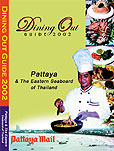by Dr. Iain
Corness
 Good maids have a secure place in any household. Special maids have a special
place. This is the story of a special maid. It is a story of courage against
seemingly insurmountable odds that will bring tears to your eyes.
Good maids have a secure place in any household. Special maids have a special
place. This is the story of a special maid. It is a story of courage against
seemingly insurmountable odds that will bring tears to your eyes.
Suchada was born in an Akha Hill Tribe village outside
Chiang Rai. She was one of four girls and two boys. Her father was
ostensibly a farmer, but in actual fact never really worked as he was an
opium addict.
Suchada did not go to school, as there was no school in
her locality. However, when she was eight years old her life changed. Her
father owed 1,200 baht to the Yao people for opium, and pressure was
brought to bear on him to pay his debt. This he could not do, so it was
agreed that he would give one of his daughters as payment. In his eyes,
Suchada was not the prettiest one, so she was given away to be a slave.
The eight year old grew up overnight. She tried to
commit suicide by jumping out of a tree. She spent that first month in
tears, until her mother came to see her, but her mother explained that
Suchada had to endure, as the honour of the family was at stake. (At this
stage in the interview, we had to stop for a while as Suchada and my
interpreter were now both crying.)
For the next 12 years Suchada endured, working as a
slave in the Yao camp. She was abused, beaten and degraded, living a life
that you and I can only vaguely imagine, until she heard people talk of a
place called Bangkok. It sounded like Nirvana. Some people took pity on
her and gave her some money for the bus and she ran away.
The bus money ran out at Samut Prakarn and the starving
girl took a job washing up, and cleaning in a restaurant. Her pay? 100
baht a month. She did not have an ID card, so once again advantage was
being taken of her.
She was willing and worked hard, even though she could
not read or write. Her employer was impressed with her diligence and
increased her wages - to 150 baht a month. Unfortunately, another man was
also impressed with her, for all the wrong reasons, and she had to run
away to escape his attentions. She took a job in a fish canning factory.
The wages were again barely above subsistence, but she was frugal and
eventually saved up enough to return to Chiang Rai as she had a plan in
the back of her mind.
She needed an ID card, so she returned to her home
village, but there was no brass band welcome for the young Suchada. She
could not recall which was her house, and went from dwelling to dwelling
asking if anyone there remembered her. Nobody did. She was dead as far as
any of the villagers were concerned, until she went to one house and saw
her father. “Do you know who I am?” she demanded. “I am the daughter
that you sold.” He refused to acknowledge who she was, saying that his
daughter was dead. She then rolled up her sleeve and showed him the
unmistakable birthmark she has on one shoulder to prove her identity, but
he showed no remorse.
Her time in her village gave her the chance to collect
some house papers to secure her ID card, but also resulted in her having
her father arrested for brutalising her mother. It was not a happy home.
She left and this time made Bangkok complete with the
new ID card and took a job as a cleaner in a hospital in Bang Na. She
saved her money until she could pay for night school to learn to read and
write Thai, but she could only afford 20 nights of 2 hours duration. But
at least it was a start.
However, Bangkok was too expensive on her cleaner’s
wages so she went to Rayong and worked as a room maid in a hotel. This was
a reasonable job, but her inability to read and write properly was a
problem. The other staff got to know that the “X” on the cleaning
sheet meant “Suchada”, but she wanted to improve.
She returned to Bangkok, taking a job as a housemaid.
She was devastated when she found out her employer had refused to let her
family speak to her after one of her sisters was involved in an accident.
If that was Bangkok, she wanted out.
She went to Hat Yai as she was told there was good
money to be made there, only to find “good money” meant bar work, a
line of employment which she would not countenance. From there she came to
Pattaya, to a series of poorly paid positions, working for people who were
prepared to pay less than the minimum for a girl with only 40 hours of
schooling in her life. The poorly educated downtrodden again. She even
worked on the road gang building Third Road in Pattaya. “That was a good
job because they paid 140 baht a day, but when the road was finished, so
was the job.”
Eventually she landed a job as the maid for a farang
and with it, some decent wages. “Life has changed. I have a motorcycle
and some money in the bank. In the future I want to buy some land and
build a small house. I like to think my family could come to live with me,
but I know that is impossible.” (Another tear was shed.)
And that is the story of Suchada, my special maid. A
story which I did not fully know until I began to write her profile, and
if you ever thought you had it tough, re-read her life’s story. That
people can continue to take advantage of the oppressed is an indictment on
us all.
P.S. Suchada starts Thai language classes next month!

 Good maids have a secure place in any household. Special maids have a special
place. This is the story of a special maid. It is a story of courage against
seemingly insurmountable odds that will bring tears to your eyes.
Good maids have a secure place in any household. Special maids have a special
place. This is the story of a special maid. It is a story of courage against
seemingly insurmountable odds that will bring tears to your eyes.
